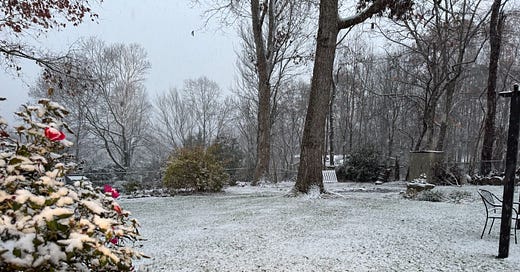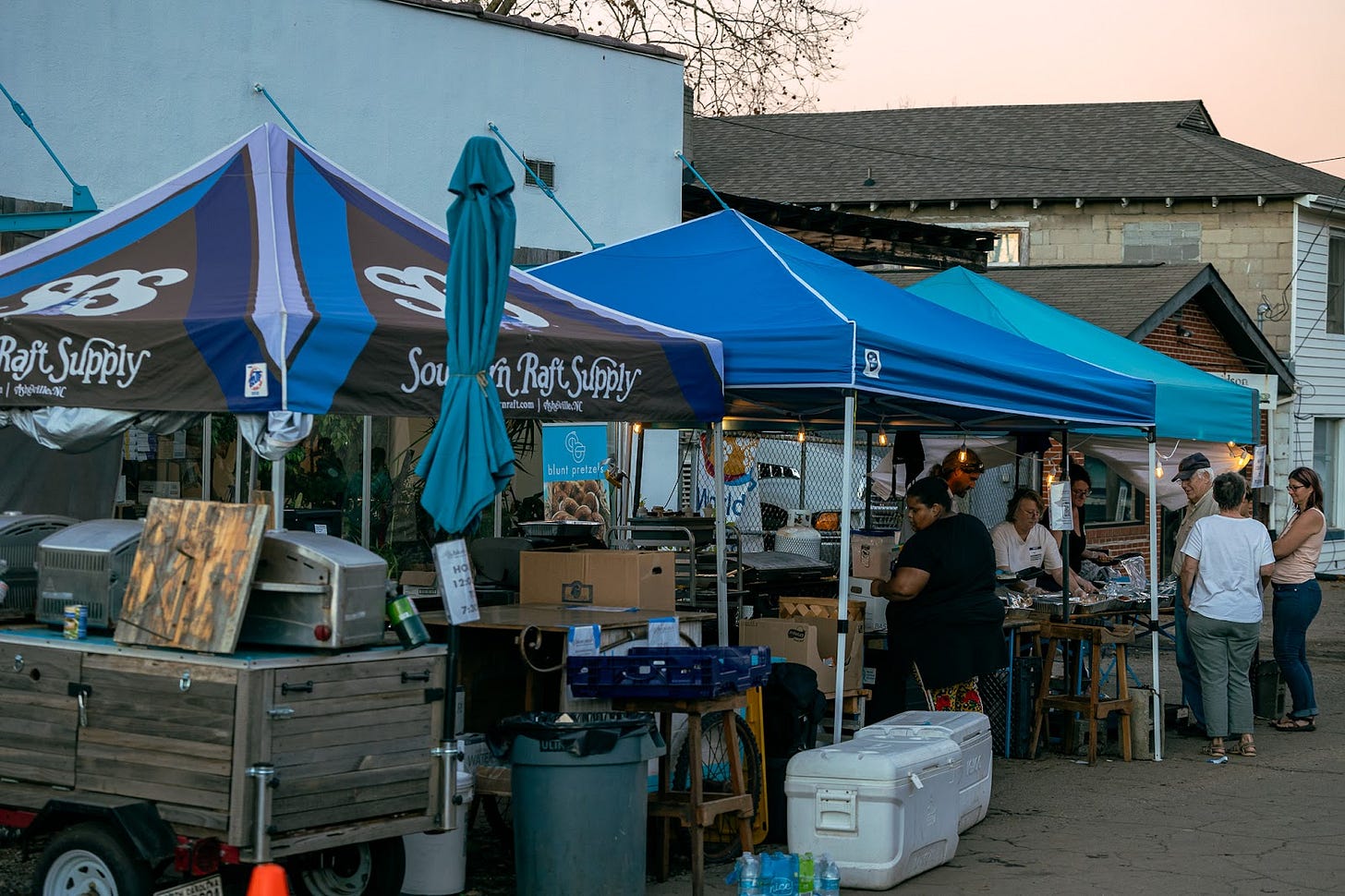Freezing temps fuel the need for heaters, temporary housing
Plus: WNC lawmakers say new relief bill falls short; Clean water restored in Asheville this week; Some state parks still closed; Marshall holds PPE fashion show; NCDOT dashboard shows 295 closures
You’re reading Mountain Updates, a free pop-up newsletter from The Charlotte Ledger examining the crisis and recovery in the N.C. mountains. Ledger subscribers can add Mountain Updates on their “My Account” page.
Sign up for free:
Many Western North Carolinians woke up to snow this morning. My father sent me this photo of my family’s backyard. Schools in Buncombe County were moved to remote instruction.
Today is a snow day for many folks in Western North Carolina. A winter weather advisory is in place through Saturday, and high winds are expected. It’s usually celebrated, but today, it just highlights the critical need for heaters and temporary housing for hundreds of displaced people. Many families are living in tents and camper vans, which don’t always have electricity.
Over the past month, Beloved Asheville has handed out both electric and propane heaters in the parking lot of Highland Brewing in east Asheville.
“Many people need heaters with power and many people need heaters with gas because many places are still without power,” Ponkho Bermejo, co-director of Beloved Asheville, told WLOS.
Over the past few weeks, the nonprofit has distributed over 1,400 heaters.
In Swannanoa, Restoration Church Pastor Josh Brown said they have been able to put 55 families into shelters and have given out between 7,000 and 10,000 heaters, WLOS reported.
“We had a family walk up yesterday that were in shorts and flip flops. That’s not going to get them through this winter,” Brown said.
Many are still waiting to hear from FEMA. In Haywood County, county leaders told WLOS that they have identified 40 to 60 possible sites for temporary housing to help expedite the process. In the meantime, FEMA has been administering vouchers to cover hotel stays.
As of last week, the Red Cross closed all six of its shelters in Buncombe County but says it will continue to support the long-term shelter in Asheville, which is now being operated by Western Carolina Rescue Ministries, the Asheville Citizen Times reported. On Wednesday, the shelter housed about 50 people.
Red Cross also says it will “stand ready” to open shelters this winter if needed.
If you’re able, consider donating to Western Carolina Rescue Ministries, Beloved Asheville, or one of the nonprofits listed at the end of this newsletter.
Let’s check in with the rest of the region:
New relief bill said to fall short: The North Carolina legislature passed a disaster recovery bill this week, but Western North Carolina lawmakers of both parties criticized the bill for lacking immediate relief. The bill, which includes $227M for recovery, allocates funds to a future session, and some lawmakers argue it doesn’t address the region’s urgent needs. (Blue Ridge Public Radio)
Meanwhile, Cooper asks for $25.5B: Gov. Cooper is requesting $25.57B in federal aid to assist with recovery efforts, but local representatives like Rep. Mark Pless contend that rushing to Washington for funds is premature without thorough damage assessments, Blue Ridge Public Radio reported. President Biden wrote a letter to the House speaker on Monday requesting additional federal assistance.
FEMA also requests more money: This week, while FEMA Administrator Deanne Criswell requested more funding, lawmakers scrutinized FEMA's response to Helene’s aftermath, with concerns about slow aid and communication gaps. Rep. Chuck Edwards highlighted FEMA’s delayed response, including problems with disaster recovery centers and unaccounted resources. Criswell defended the agency, citing staffing challenges and funding limitations. (Blue Ridge Public Radio)
Clean water restored to thousands: In case you missed it on Monday, the Asheville area’s 52-day water crisis has officially ended. Clean drinking water has been restored to approximately 160,000 residents after extensive repairs and testing of the North Fork Reservoir system. (Ledger)
But there are worries about lead in the water: Following lead detection in Asheville schools, over 4,000 residents have requested lead-testing kits. While the city’s source water and distribution pipes show no lead, aging plumbing in older buildings poses risks. A 19-day lapse in corrosion control, essential for preventing lead leaching, has heightened concerns, though treatment resumed on Oct. 30. Comprehensive testing results are expected in 4-6 weeks. (Asheville Citizen Times)
Status of affected state parks: Many Western North Carolina state parks remain closed due to road and trail damage. Some parks, like Chimney Rock and Mount Mitchell, face prolonged closures for significant repairs, while others, such as Gorges and Grandfather Mountain, have reopened partially. Park officials urge visitors to avoid closed areas for safety reasons and to allow repair work to continue. (Asheville Citizen Times)
In the name of fashion: In the town of Marshall, community members organized the “Dirty Broads fashion show” to honor local artist Lois Simbach, who lost her home and studio in the storm. The clothes were mostly made from personal protection equipment (PPE), like hard hats, mesh orange construction vests, KN95 masks and latex gloves. The event honored Simbach’s 30 years of contributions to Marshall’s arts scene. (Asheville Citizen Times)
NCDOT dashboard shows 295 road closures following Tropical Storm Helene
About 295 roads remain closed across North Carolina due to storm damage, according to a dashboard from the North Carolina Department of Transportation.
Since the beginning of the storm, 1,066 of the 1,352 damaged roads have been fully reopened, and 98 roads are partially opened. The dashboard tracks Helene road closures and openings across the state, but a majority of the road closures exist in Western North Carolina.
🎥 WATCH: Woman donates supplies and $20,000 in Asheville … using money from OnlyFans
 Tiktok failed to load.
Tiktok failed to load.Enable 3rd party cookies or use another browser
N.C. writer Jeremy Markovich, who discussed the video in his Substack newsletter North Carolina Rabbit Hole, wrote:
I have seen a lot of videos showing the relief efforts after Hurricane Helene hit Western North Carolina. The ending of this one is … unique.
Photo of the day: Distribution sites are still operating 2 months later
Supply distribution sites, like the one pictured above in Swannanoa, are providing hot meals and essential supplies two months after the storm hit. As the mountains prepare for freezing temperatures this winter, supplies like blankets, heaters and propane are critical. (Photo courtesy of Rey Castillo Jr.)
—
Lindsey Banks, a native of the Buncombe County town of Swannanoa, is a staff reporter with The Charlotte Ledger. Reach her at lindsey@cltledger.com.
How to help
Many organizations have deployed groups across the region, tasked with distributing food, water and supplies. You can donate to their efforts at the links below.
Hearts with Hands, a local disaster relief organization, has a donation page to provide food, supplies and water.
United Way of North Carolina has established a fund to help residents affected by the flooding.
MANNA Foodbank, which serves 16 counties in Western North Carolina, is accepting food, supplies and monetary donations. The organization’s warehouse on Swannanoa River Road in Asheville was damaged by the hurricane.
The American Red Cross is accepting donations to help residents in the Southeast.
Samaritan’s Purse, which is headquartered in Boone, is scheduling volunteers to help with debris cleanup.
Operation Blessing has a donation page to provide food, supplies and water.
E4E Relief, a Charlotte-headquartered provider of emergency financial relief programs on behalf of corporations, is accepting donations for their newly established Hurricane Helene Community Fund, offering financial support to individuals with long-term impacts from Hurricane Helene.
Need to sign up for this e-newsletter? We offer a free version, as well as paid memberships for full access to all of our local newsletters:
➡️ Opt in or out of different newsletters on your “My Account” page.
➡️ Learn more about The Charlotte Ledger
The Charlotte Ledger is a locally owned media company that delivers smart and essential news through e-newsletters and on a website. We strive for fairness and accuracy and will correct all known errors. The content reflects the independent editorial judgment of The Charlotte Ledger. Any advertising, paid marketing, or sponsored content will be clearly labeled.
Like what we are doing? Feel free to forward this along and to tell a friend.
Social media: On Facebook, Instagram, Twitter and LinkedIn.
Sponsorship information/customer service: email support@cltledger.com.
Executive editor: Tony Mecia; Managing editor: Cristina Bolling; Staff writer: Lindsey Banks; Business manager: Brie Chrisman








